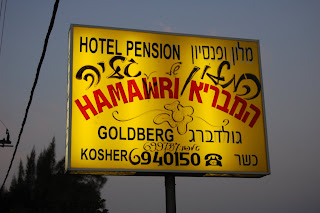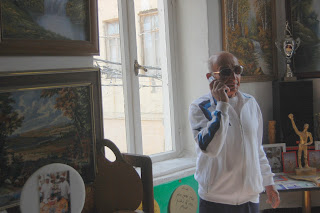The well maker

Took a trip last weekend with friends to the village of Metula which is slap bang on the Lebanese border a few kilometers north of Kiryat Shemoneh. We were hosted by Galia Goldberg at Hamavri , an archaic name (literally translates into “the well maker”) but somehow appropriate for an old-fashioned , friendly family hotel . The vivacious Galia is the widow of the late Yossi Goldberg who was Metula’s mayor and, for a few years, a Member of Knesset. Their son, Eyal, who joined us, made a sensitive and compassionate documentary film about his lively family and how they contended with his emergence from the closet. There are some unforgettable scenes of his domineering, eccentric yet loving grandmother and her bitter sweet-relationship with his grandfather. Both of them have died meanwhile, as has his father Yossi.

Metula – founded in 1896- is about as close as you get to an authentic Jewish village (as opposed to kibbutz or moshav) in Israel: old stone houses, home-made jam, wood fires, thick soups, a tractor in the yard , the fruit ripening in the orchard, the local election campaign posters on the main street. At the same time, the twist and turns of history, and of the economy, have brought about some changes.

First, its clear that Metula makes as much money from tourism as it does from agriculture. The main street is packed with hotels (some extremely ugly) and restaurants (some of them good). Another striking feature are the Thai workers, wearing broad hats and scarves, we saw zipping around on tractors or resting outside prefabricated dormitories. Globalization and higher living standards in Israel means it is them and not the local lads of Metula who are doing the hard agricultural labour in the orchards and fields. And not just in Metula - throughout Israel.
After Israel finally withdrew from southern Lebanon in May 2000 some of the Christian residents of southern Lebanon who, with Israel’s agreement, had been regularly crossing through the 'Good Fence' to work in the Galilee, managed to escape into Israel and receive asylum. They were associated with the Israeli-backed South Lebanese Army which collapsed with Israel's departure and was immeidtaely replaced by Hizbullah. There are still several Lebanese families working in hotels in Metula - which is probably why the food tasted so good there.

There is however an unwritten agreement with the Lebanese neighbours who open the sluices and let the rainwater flow over the border into the nearby nahal Ayoun nature reserve where it flows down a series of waterfalls, the biggest being the tanur (oven). Since the neighbours have yet to turn on the tap the waterfall above is dry.
Not mentioned in the Wikipedia description, Metula also bears a scar. Its fields used to stretch north of the present border into the fertile Marjayoun valley. However the 1916 Sykes-Picot agreement that carved out Lebanon and Syria, left Metula's fields on the Lebanese side. The local farmers were eventually compensated with inferior land in the Hula Valley but some never got over the blow. One bricked over his window so as not to have to look at the lands he lost.


And the first winter flowers can be seen. It was good to get out of the big city.



Comments